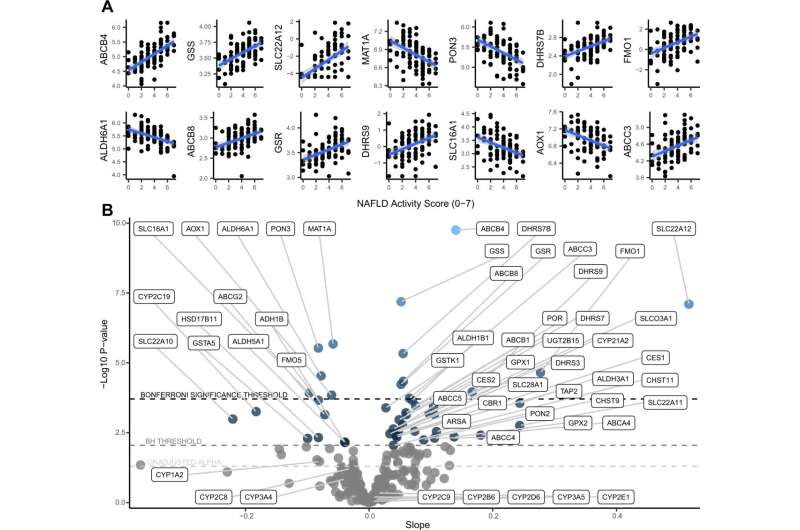This article has been reviewed according to Science X's editorial process and policies. Editors have highlighted the following attributes while ensuring the content's credibility:
fact-checked
peer-reviewed publication
trusted source
proofread
People with NAFLD may have decreased expression of a liver enzyme needed for medication processing

People with non-alcoholic fatty liver disease (NAFLD) may process certain medications less effectively due to significantly decreased levels of an important enzyme, according to a new study from Indiana University School of Medicine. A team of researchers led by Nick Powell, PharmD, and Naga Chalasani, MD, published their findings in the article "Clinically important alterations in pharmacogene expression in histologically severe nonalcoholic fatty liver disease" in the journal Nature Communications in March.
Powell, who is an assistant research professor of medicine in the school's Division of Clinical Pharmacology, said he and his team were building on existing evidence that people with NAFLD may be at risk for altered response to some commonly used medications.
"We wanted to see if this could be due to changes in how the liver expresses genes important to handling the metabolism and transport of these medicines in the body," he said.
Subsequently, the team found that the gene responsible for making an enzyme called CYP2C19 was significantly decreased in liver biopsies of people with worsening NAFLD.
"Further studies will be needed, but our results suggest that people with NAFLD will have slower clearance of certain medications from their body–like some antidepressants–and that medicines which use CYP2C19 to become activated may not work as well, such as the antiplatelet medicine clopidogrel," he said.
Naga Chalasani, MD, the study's senior author, said these findings could have a global impact.
"Our findings have immediate potential implications for patients with NAFLD and nonalcoholic steatohepatitis (NASH), which are both highly prevalent here in the United States and around the world," he said.
That impact is largely due to the potential for new approaches to development and prescribing of medications that are sensitive to metabolism by the CYP2C19 enzyme, according to the paper.
"Our findings are exciting from a precision medicine standpoint because we can now work on making medicines safer and more effective for people with NAFLD," said Powell.
More information: Nicholas R. Powell et al, Clinically important alterations in pharmacogene expression in histologically severe nonalcoholic fatty liver disease, Nature Communications (2023). DOI: 10.1038/s41467-023-37209-1


















